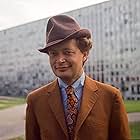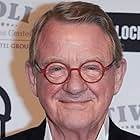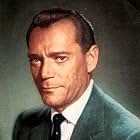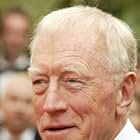Just after World War II, an American takes a railway job in Germany, but finds his position politically sensitive with various people trying to use him.Just after World War II, an American takes a railway job in Germany, but finds his position politically sensitive with various people trying to use him.Just after World War II, an American takes a railway job in Germany, but finds his position politically sensitive with various people trying to use him.
- Awards
- 17 wins & 8 nominations
- Narrator
- (voice)
- Director
- Writers
- All cast & crew
- Production, box office & more at IMDbPro
Storyline
Did you know
- TriviaLars von Trier: the Jew who signs the affidavit clearing the name of the Zentropa owner.
- GoofsIn the transition before Leopold and Katharina get married, Leopold is initially on Katharina's left side before the altar, but at the end of the transition, he is on her right.
- Quotes
[opening lines]
Narrator: You will now listen to my voice. My voice will help you and guide you still deeper into Europa. Every time you hear my voice, with every word and every number, you will enter into a still deeper layer - open, relaxed and receptive. I shall now count from one to ten. On the count of ten, you will be in Europa. I say: one. And as you focus your attention entirely on my voice, you will slowly begin to relax. Two - your hands and your fingers are getting warmer and heavier. Three - the warmth is spreading through your arms, to your shoulders and your neck. Four - your feet and your legs get heavier. Five - the warmth is spreading to the whole of your body. On six, I want you to go deeper. I say: six. And the whole of your relaxed body is slowly beginning to sink. Seven - you go deeper and deeper and deeper. Eight - on every breath you take, you go deeper. Nine - you are floating. On the mental count of ten, you will be in Europa. Be there at ten. I say: ten.
- ConnectionsFeatured in The Making of 'Europa' (1991)
- SoundtracksEuropa Aria
Written by Lars von Trier
Performed by Nina Hagen and Philippe Huttenlocher
Courtesy of Virgin Musique
This progression starts when Leo, played rather memorably by the calm yet restless actor Jean-Marc Barr, meets a sultry heiress on the train played by Barbara Sukowa, an actress with gentility on the surface but internal vigor. She seduces him and then takes him home to meet her family, which owns the company which manufactures the trains. These were the precise trains that took Jews to their deaths during the war, but now they run a drab day-to-day timetable, and the woman's Uncle Kessler postures as another one of those good Germans who were just doing their jobs. There is also Udo Kier, the tremendous actor who blew me away in Von Trier's shocking second film Epidemic, though here he is mere scenery.
Another guest at the house is Eddie Constantine, an actor with a quiet strength, playing a somber American intelligence man. He can confirm that Uncle Kessler was a war criminal, though it is all completely baffling to Leo. Americans have been characterized as gullible rubes out of their element for decades, but little have they been more blithely unconcerned than Leo, who goes back to his job on what gradually looks like his own customized death train.
The story is told in a purposely uncoordinated manner by the film's Danish director, Lars Von Trier, whose anchor is in the film's breathtaking editing and cinematography. He shoots in black and white and color, he uses double-exposures, optical effects and trick photography, having actors interact with rear-projected footage, he places his characters inside a richly shaded visceral world so that they sometimes feel like insects, caught between glass for our more precise survey.
This Grand Jury Prize-winning surrealist work is allegorical, but maybe in a distinct tone for every viewer. I interpret it as a film about the last legs of Nazism, symbolized by the train, and the ethical accountability of Americans and others who appeared too late to salvage the martyrs of these trains and the camps where they distributed their condemned shiploads. During the time frame of the movie, and the Nazi state, and such significance to the train, are dead, but like decapitated chickens they persist in jolting through their reflexes.
The characters, music, dialogue, and plot are deliberately hammy and almost satirically procured from film noir conventions. The most entrancing points in the movie are the entirely cinematographic ones. Two trains halting back and forth, Barr on one and Sukowa on another. An underwater shot of proliferating blood. An uncommonly expressive sequence on what it must be like to drown. And most metaphysically affecting of all, an anesthetic shot of train tracks, as Max von Sydow's voice allures us to hark back to Europe with him, and abandon our personal restraint.
- How long is Europa?Powered by Alexa
Details
- Release date
- Countries of origin
- Official site
- Languages
- Also known as
- Zentropa
- Filming locations
- Production companies
- See more company credits at IMDbPro
Box office
- Budget
- DKK 28,000,000 (estimated)
- Gross US & Canada
- $1,007,001
- Opening weekend US & Canada
- $21,447
- May 25, 1992
- Gross worldwide
- $1,026,035
- Runtime1 hour 52 minutes
- Color
- Sound mix
- Aspect ratio
- 2.35 : 1
Contribute to this page



















